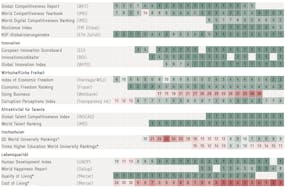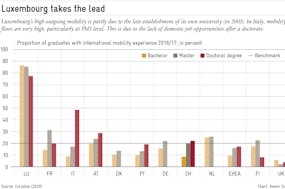Drivers who use the platform provided by the driving service provider Uber are deemed to be employees rather than self-employed. The Swiss Federal Supreme Court recently upheld a ruling on the matter by the Cantonal Court of Geneva. Besides the cantonal authorities, trade unions were especially pleased with this turn of events. What nobody seems to mind much is that hundreds of employees were, at least temporarily, prevented from doing their job. As a result of this decision, Uber will now hire its drivers in Geneva indirectly via transport companies. Does this solve the problem? Only superficially. Employees who value flexible working hours will be left out in the cold.
The question of Uber drivers’ dependence or independence is first and foremost a legal one. It’s relevant because the nature of the activity determines the level of protection afforded by social security and labor law. However, the digital transformation of the way we work also has to be looked at from an economic perspective, and highlights a need for political action. Digital platforms look set to continue challenging established providers in the future, creating new jobs whose status lies somewhere between self-employed and employee. Labor and social security law needs to keep up with this development. Otherwise there’s the risk that it will inhibit innovation as alternative forms of employment gain in importance.

Digital platforms are creating new jobs in the zone between employee and self-employed status. (Dan Gold, Unsplash)
Opportunities and benefits of flexible working arrangements
It’s possible to dogmatically write off work on digital platforms such as Uber as precarious employment. But it’s important to also consider the new opportunities arising from these forms of work. They offer additional opportunities and (re)integration options, especially for people who are disadvantaged in the traditional labor market (for example because of poor language skills) or who can’t find the desired flexibility (for example students or parents). In this regard it’s somewhat ironic that it’s precisely those groups that have taken up the cause of a better work/family life balance that are fighting flexible employment models. In many cases platform work is unlikely to be a steppingstone to a successful career. However, it can boost the financial autonomy of people who would otherwise be dependent on social benefits. To a certain extent, gig economy platforms provide an additional social safety net.
Studies in the United States have shown that Uber drivers greatly value time flexibility. This means that many drivers are willing to perform driving services and accept lower wages than they would earn working fixed hours. This particularly benefits women, younger people, and drivers with low incomes.
While the situation in the US can’t exactly be compared with Switzerland, there is also a certain demand for flexible work models in this country, even though the market for platform work is still modest. In 2019, 0.4% of the Swiss population worked for a platform, mostly sporadically in jobs on the side. Further evidence of the benefits of time flexibility is provided by Uber data from Geneva. In contrast to the driving service, in 2020 the company started hiring its Geneva couriers for the food delivery service Uber Eats through a third-party company. Since then, food couriers have had better social security coverage – but have worked less flexible shifts. This seems to have led to a significant number of couriers stopping work for Uber Eats. It would be interesting to see if the same development takes place with the driving service.
However, the focus on Uber distorts public perception. The employee profiles and qualifications required by these digital platforms are very varied, and new opportunities are opening up even for highly trained people.
New status: “self-employed employee”
Of course platform work also entails risks, especially in terms of social security coverage. Pension gaps and a potential burden on the public coffers must be prevented. Nonetheless, the economically relevant question of effective employment alternatives is often forgotten. It doesn’t help the state or the employees affected if they work less or not at all. This issue is reminiscent of the debate on minimum wages. In this case, too, there are conflicting goals between distributive justice and employment objectives. In both cases there’s a risk that those you actually want to protect will be driven into unemployment (or prevented from joining the workplace).
The abovementioned federal court ruling once again raises the question of whether the strict dichotomy between labor and social security law can be maintained in the long term. Avenir Suisse has pointed out a possible solution involving the creation of a third category, the “self-employed employee.” This status would combine flat-rate social security coverage with comprehensive contractual freedom. In the case of Uber, this would allow rigid work regulations (e.g., a fixed workload) to be dispensed with. At the same time, Uber drivers would benefit from social security coverage, albeit it to a lesser extent than for conventional employees.
In a report last year, however, the Swiss Federal Council stated that there was no need for action regarding platform work, and praised the flexibility of the current law. Whether this is sufficient to prevent new forms of work from being nipped in the bud remains to be seen. The federal court ruling gives an inkling of how similar cases are likely to be judged in the future. The Lausanne judges’ decision is likely to keep both platform operators and politicians busy.
Changes in the workplace are also showing how current labor and social security law is lagging behind societal developments in other areas. Homeworking and the increasing frequency of part-time jobs and multiple employment call for a modernization of working hour regulations and changes in occupational pension schemes. But here too, the mills of politics grind slowly. Switzerland would do well to address its chronic reform roadblocks and to view societal change not primarily as a risk, but as an opportunity.





